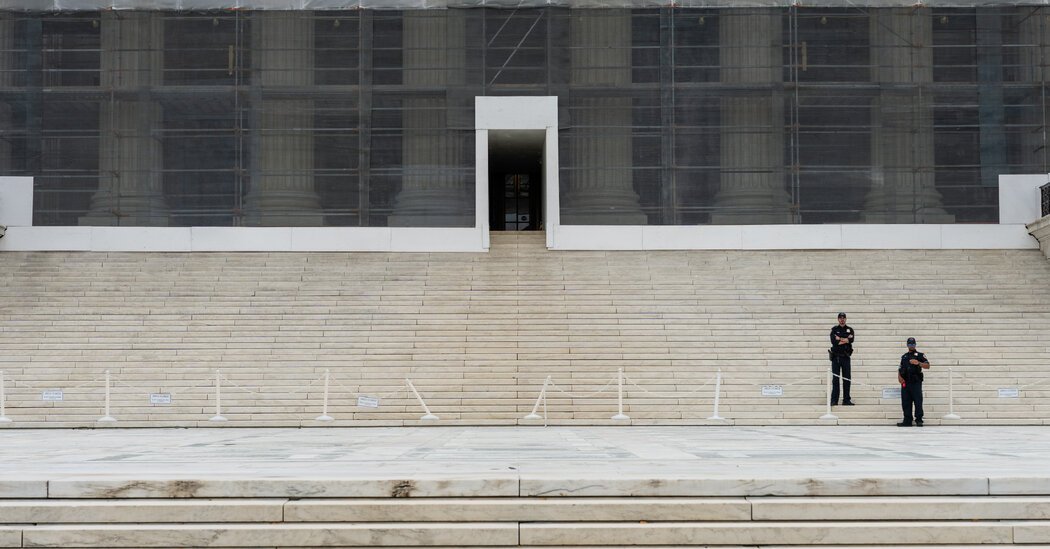Supreme Court Allows Mississippi Law on Children’s Use of Social Media, for Now
The Supreme Court on Thursday refused to block a Mississippi law barring minors from using social media sites including Facebook, Instagram, Reddit, Snapchat, YouTube and X without their parents’ consent. The court’s brief order was unsigned and gave no reasons, which is typical when the justices act on emergency applications. The order was not the…
The Supreme Court on Thursday refused to block a Mississippi law barring minors from using social media sites including Facebook, Instagram, Reddit, Snapchat, YouTube and X without their parents’ consent.
The court’s brief order was unsigned and gave no reasons, which is typical when the justices act on emergency applications. The order was not the last word in the case, which will proceed in a federal appeals court and may again reach the justices.
The challenged law, enacted last year, seeks to limit minors’ access to sites allowing them “to socially interact with other users.” Lawmakers said they sought to protect children from sex trafficking, sexual abuse, violence, grooming and harassment. More generally, they said, they were concerned about the harmful effects of social media use on young people.
The law does not apply to sites mainly devoted to news, sports, commerce or video games. It also exempts email and direct messages.
It requires social media sites to verify users’ ages and to block those under 18 unless they have their parents’ permission. Sites that violate the law may be fined $10,000 per incident and could face criminal penalties.
NetChoice, a trade association, challenged the law on behalf of nine social media sites, saying it violated the First Amendment.
In a brief concurrence, Justice Brett M. Kavanaugh wrote that he, too, believed the law was “likely unconstitutional,” and that NetChoice would most likely succeed in arguing so down the road. But he nonetheless agreed with the court’s conclusion that the company had not so far demonstrated that it would be overwhelmingly harmed by the law temporarily taking effect while the case proceeds through the courts.
About a dozen other states have broadly similar laws. Seven other courts have blocked laws like the one in Mississippi, NetChoice told the justices.
Judge Halil Suleyman Ozerden issued a preliminary injunction in June blocking the law while the trade group’s challenge moved forward. In a 35-page decision, the judge accepted that “safeguarding the physical and psychological well-being of minors online is an important governmental interest” but ruled that the law appeared to apply to “substantially more speech than is necessary for the state to accomplish its goals.”
Judge Ozerden was appointed by President George W. Bush. President Trump nominated him to the U.S. Court of Appeals for the Fifth Circuit in 2019, but he faced opposition from some Republicans who said he was not conservative enough, and he did not receive a vote.
A unanimous three-judge panel of the U.S. Court of Appeals for the Fifth Circuit paused Judge Ozerden’s injunction, reviving the law. That ruling was one sentence long and gave no reasons.
The Supreme Court’s precedents have protected the First Amendment rights of both children and social media sites.
In 2011, the court struck down a California law that banned the sale of violent video games to children. Justice Antonin Scalia, writing for the majority, said that states did not have “the power to prevent children from hearing or saying anything without their parents’ prior consent.”
If they did, he wrote, they could make it a crime “to admit persons under 18 to a political rally without their parents’ prior written consent — even a political rally in support of laws against corporal punishment of children, or laws in favor of greater rights for minors.”
In 2024, the court also affirmed that the First Amendment protected the companies’ speech, though it sidestepped a definitive resolution of a pair of cases challenging state laws aimed at curbing the power of social media companies to moderate content. “Laws curtailing their editorial choices must meet the First Amendment’s requirements,” Justice Elena Kagan wrote. “The principle does not change because the curated compilation has gone from the physical to the virtual world.”
In June, however, the court upheld a Texas law that sought to limit minors’ access to pornography on the internet, ruling that it did not violate the First Amendment to require people to verify their age through measures like the submission of government-issued IDs.
The trade group said that pornography was “a unique category of speech” that could justify restricting minors’ access. The Mississippi law, the trade group said, concerns speech fully protected by the First Amendment.
In response, Lynn Fitch, the state’s attorney general, told the justices that the law “protects children from predators.”
“The internet provides a forum for inflicting life-altering harms on children — sex trafficking, sexual abuse, physical violence, grooming, targeted harassment and more,” she wrote, adding that those potential harms amply justified the law.







